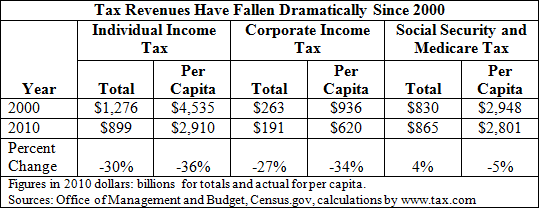The federal deficit has been a hot topic for awhile now, with an overwhelming chorus reciting that the federal government has a spending problem, and that drastic cuts are needed to close the deficit. But is spending the whole problem? Without a doubt, federal spending has increased a great deal the past few years in response to the recession, not to mention a decade’s worth of wartime spending. But we’ve also seen major tax reductions, the “Bush tax cuts” of 2001 and 2003, and their subsequent extension this past winter. Don’t tax cuts contribute to the deficit too?
Not according to their proponents. The tax cuts of the early 2000s were promised to actually raise revenue. It’s a familiar refrain that is repeated by politicians and pundits; tax cuts help grow the economy and increase jobs, which then allows the tax cuts to pay for themselves. Unfortunately, this is rarely true, and as it turns out, the federal government has a serious revenue problem.
Across the board, federal revenue was significantly lower in 2010 than it was in 2000. Total individual income taxes were down 30% in real terms, while corporate income taxes fell by 27%, despite corporate profits increasing 60%. Payroll taxes increased slightly, but fell per capita, as the population grew five times as fast as the workforce. Clearly, lower tax rates did not result in increased revenues.
In fact, if individual and corporate income taxes had just remained flat (adjusting for inflation) from 2000 to 2010, the 2010 federal deficit would have been $449 billion lower, a reduction of nearly 40%.
Now certainly, the recession played a role in lowering revenue, but even with the recession, real GDP grew 16% from 2000 to 2010, but as shown above the growth did not translate into tax revenue. The growth also did not translate into the taxpayer’s wallet, as average wages continued to stagnate in real terms, with a decline from $39,194 in 2000 to $39,055 in 2009.
The promise of tax cuts turned out to be an empty one. Economic growth was anemic, wages went nowhere, job growth was scarce, and the federal deficit exploded. All of which makes recovering from this recession that much more difficult.
So as we begin to tackle the federal deficit, let’s make sure we look at the whole picture.
